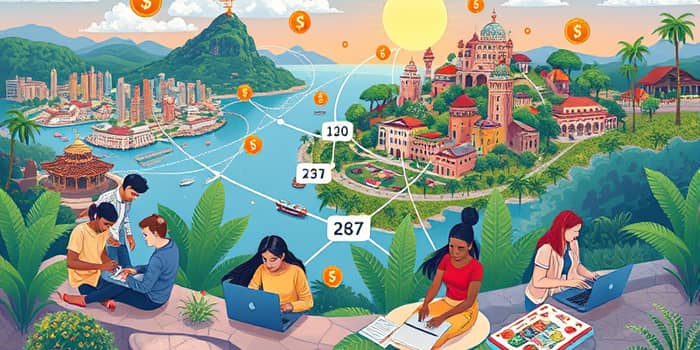
In an era defined by global connectivity, professionals are no longer bound by office walls or time zones. Digital nomads illustrate a profound shift in how we work, live, and manage money across borders.
The borderless economy offers unprecedented freedom—but also unique financial challenges. By understanding key trends and adopting practical strategies, location-independent workers can thrive both personally and professionally.
Digital nomads span a wide spectrum of roles and industries. While the average digital nomad is 36 years old, they are far from a homogeneous group.
Across the globe, digital nomads earn an average annual income worldwide of approximately $124,000, with a median of $85,000. Income distribution showcases both mid-range earners and affluent powerhouses.
In the United States, 42% of digital nomad households earn over $75,000 annually, while 19% fall below $25,000. Remarkably, 79% of nomads report being highly satisfied with their income and lifestyle—far exceeding the 62% satisfaction rate of traditional workers.
The digital banking revolution reshaping cross-border payments has been a game-changer for location-independent professionals. Key elements of effective money management include:
Maintaining emergency funds in multiple currencies to buffer against unexpected costs and exchange rate swings.
Flexible, globally diversified portfolios help mitigate risk through currency-hedged investments and international assets.
Access to robust fintech solutions allows for efficient money transfers, real-time budgeting, and automated expense tracking. Many nomads leverage multi-currency accounts and borderless digital banks to minimize fees and streamline transactions.
Adopting a minimalist lifestyle with lower overhead costs is a hallmark of the nomadic mindset. Without long-term mortgage commitments, nomads often choose short-term rentals in vibrant locations.
However, fluctuating travel and healthcare expenses demand disciplined budgeting. Unexpected visa fees, sudden changes in accommodation costs, and varying living standards require constant vigilance.
To safeguard financial stability, nomads cultivate multiple income streams through diverse gigs. If one project ends, others can sustain cash flow until new opportunities arise.
Digital nomads inject fresh capital into host communities, boosting local businesses—from cafes and coworking spaces to hospitality services. Their presence often accelerates infrastructure improvements, such as enhanced internet connectivity and expanded transport options.
Additionally, nomads facilitate cross-cultural exchange. Through skill-sharing workshops or informal mentoring, they contribute to local knowledge economies. Yet, rapid influxes can also drive up living costs and spark debates over resource competition.
At its core, the boundless economy embraces minimalism, sustainability, and adventure. Home becomes a fluid concept—defined by connectivity and community rather than a fixed address.
Nomads often build virtual networks alongside their local connections, fostering a global sense of belonging. This evolving paradigm encourages innovation, as diverse perspectives collide and inspire new ventures.
As more countries roll out dedicated nomad visas, professionals can legally reside in popular hubs for extended periods. Yet, many face complex tax landscapes, juggling obligations in both home and host nations.
Strategies range from establishing tax residency in favorable jurisdictions to adopting perpetual traveler frameworks. However, these approaches demand careful planning with qualified advisors to avoid unintended penalties.
Embracing a nomadic lifestyle unlocks unparalleled freedom, but also demands proactive, adaptive financial planning. By leveraging modern fintech tools, adopting diversified income strategies, and understanding global tax systems, digital nomads can confidently navigate the borderless economy.
Ultimately, success lies in balancing the thrill of discovery with disciplined money management—ensuring that wherever you roam, your financial future remains secure.
References













